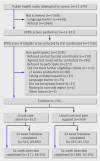Effect of peer support on prevention of postnatal depression among high risk women: multisite randomised controlled trial
- PMID: 19147637
- PMCID: PMC2628301
- DOI: 10.1136/bmj.a3064
Effect of peer support on prevention of postnatal depression among high risk women: multisite randomised controlled trial
Abstract
Objective: To evaluate the effectiveness of telephone based peer support in the prevention of postnatal depression.
Design: Multisite randomised controlled trial.
Setting: Seven health regions across Ontario, Canada.
Participants: 701 women in the first two weeks postpartum identified as high risk for postnatal depression with the Edinburgh postnatal depression scale and randomised with an internet based randomisation service.
Intervention: Proactive individualised telephone based peer (mother to mother) support, initiated within 48-72 hours of randomisation, provided by a volunteer recruited from the community who had previously experienced and recovered from self reported postnatal depression and attended a four hour training session.
Main outcome measures: Edinburgh postnatal depression scale, structured clinical interview-depression, state-trait anxiety inventory, UCLA loneliness scale, and use of health services.
Results: After web based screening of 21 470 women, 701 (72%) eligible mothers were recruited. A blinded research nurse followed up more than 85% by telephone, including 613 at 12 weeks and 600 at 24 weeks postpartum. At 12 weeks, 14% (40/297) of women in the intervention group and 25% (78/315) in the control group had an Edinburgh postnatal depression scale score >12 (chi(2)=12.5, P<0.001; number need to treat 8.8, 95% confidence interval 5.9 to 19.6; relative risk reduction 0.46, 95% confidence interval 0.24 to 0.62). There was a positive trend in favour of the intervention group for maternal anxiety but not loneliness or use of health services. For ethical reasons, participants identified with clinical depression at 12 weeks were referred for treatment, resulting in no differences between groups at 24 weeks. Of the 221 women in the intervention group who received and evaluated their experience of peer support, over 80% were satisfied and would recommend this support to a friend.
Conclusion: Telephone based peer support can be effective in preventing postnatal depression among women at high risk.
Trial registration: ISRCTN 68337727.
Conflict of interest statement
Competing interests: None declared.
Comment in
-
Preventing and treating postnatal depression.BMJ. 2009 Jan 15;338:a2975. doi: 10.1136/bmj.a2975. BMJ. 2009. PMID: 19147635 No abstract available.
-
Telephone based peer support can reduce postnatal depression in women at high risk.Evid Based Ment Health. 2009 Aug;12(3):82. doi: 10.1136/ebmh.12.3.82. Evid Based Ment Health. 2009. PMID: 19633250 No abstract available.
References
-
- O’Hara M, Swain A. Rates and risk of postpartum depression—a meta-analysis. Int Rev Psychiatry 1996;8:37-54.
-
- Murray L, Fiori-Cowley A, Hooper R, Cooper P. The impact of postnatal depression and associated adversity on early mother-infant interactions and later infant outcome. Child Dev 1996;67:2512-26. - PubMed
-
- Mayberry LJ, Affonso DD. Infant temperament and postpartum depression: a review. Health Care Women Int 1993;14:201-11. - PubMed
-
- Hipwell AE, Goossens FA, Melhuish EC, Kumar R. Severe maternal psychopathology and infant-mother attachment. Dev Psychopathol 2000;12:157-75. - PubMed
-
- Murray L. The impact of postnatal depression on infant development. J Child Psychol Psychiatry 1992;33:543-61. - PubMed

